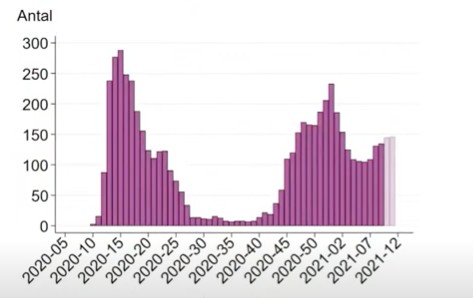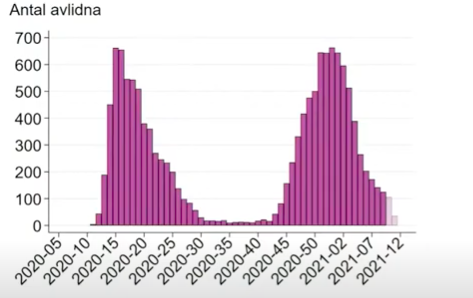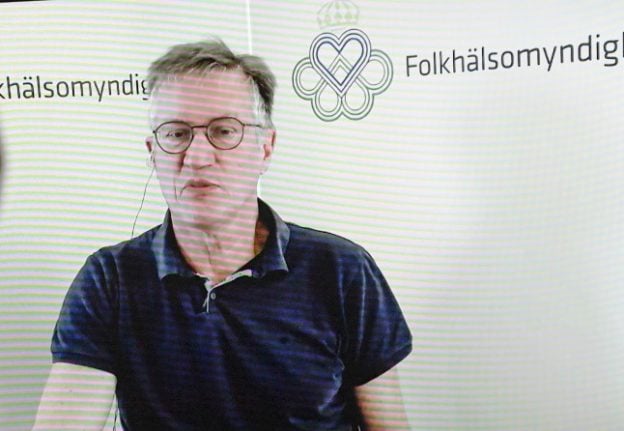Asked by The Local if he believed that the ‘sportlov’ holidays had played a role in the current high levels of infection, Sweden’s state epidemiologist Anders Tegnell said that his current understanding was that the holidays had had “no effect whatsoever”, based on infection rates in and around the mountain resorts.
An analysis carried out in Skåne, in the south of Sweden, he added, even suggested that the infection spread had been higher among those who stayed at home over the one-week holiday, than among those who spent it in the mountains.
“There was some data from the south of Sweden where they compared the number of people that came back from skiing holidays who were infected, and compared that to the number of reported infections among people who stayed in Skåne, and it looked like there was an overrepresentation among people who stayed in Skåne compared to the ones who went off.”
“Quite a rapid increase”
In the press conference, Tegnell said that the number of new cases a day had grown by about 18 percent over the past two weeks.
“Unfortunately, over the past two weeks, we have had a rather significant increase, about 18 percent,” he said. “We are still in a phase where we have widespread infection. It is not sustainable to remain at this level for long. Sweden absolutely needs to bring the rate of infection significantly down.”
Asked why his agency did not then bring in further restrictions, as other countries have done, Tegnell noted that such countries were also seeing increased infection rates.
“This is a pattern we are seeing in a lot of countries, even countries with rather comprehensive restrictions are seeing quite a sharp increase,” he said.

The rise in the number of cases was being followed, he said, by rising admissions to intensive care wards.

The bright spot in the update was that the number of deaths each day continues to decline week-on-week, even if its rate of decline has slowed.
“As we have said earlier, this is very likely to be the result of the vaccination work, which means that those in elderly care facilities are now well protected,” Tegnell said. “Now practically everyone who lives in an elderly care facility has been protected.”
Sweden has now given 1,385,975 vaccine doses, with 971,736 people having received one dose and 414,239 having received both doses. Some 11.9 percent of those over 18 years old have now had at least one dose.
But Tegnell said the country still had “quite a bit to go” before vaccinations would lead to an impact on the spread of the virus. This is partly due to the fact that it is mainly elderly people who have been vaccinated so far, who are not significant drivers of the infection, and also because the virus — and particularly more recently reported variants — is very highly contagious.

No AstraZeneca vaccine for women under the age of 55?
Asked by The Local if the Public Health Agency might decide to withhold the AstraZeneca vaccine from certain subsections of the population, on the basis that almost all of those affected by life-threatening blood clots have been women under the age of 55, Tegnell said that that was a possibility being looked at.
“We’re looking at different scenarios. And that’s definitely one of the possible responses,” Tegnell said.
The agency is aiming to understand “which groups are affected and which are less affected so we can see which groups we can vaccinate”, he said.
“We are nearly there,” he said of the decision on whether to resume vaccinations with the AstraZeneca jab. “We are planning on presenting a report and also a proposal on how we will continue to vaccinate in two days.”
He said that he hoped that the decision to suspend the use of the AstraZeneca jab for more than a week would not undermine public confidence.
“We hope that the delay that we have had while we go thoroughly through the evidence is going to increase confidence in the vaccine again by creating an understanding over where the risks are and where they are not.”



 Please whitelist us to continue reading.
Please whitelist us to continue reading.
In view of his many lies, catastrophic decisions and mistakes, I am most surprised that Anders Tegnell still has his job.
… I am confident we will al be vaccinated by Midsommar … 2023